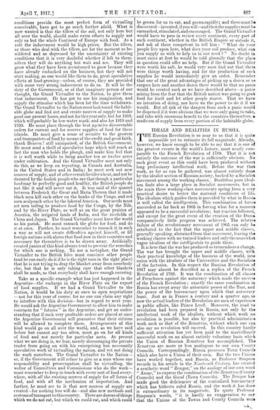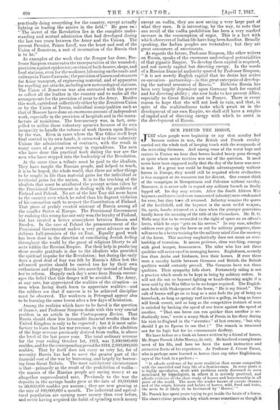IDEALS AND REALITIES IN RUSSIA. T HE Russian Revolution is so
near to us that it is quite impossible yet to estimate its full magnitude. Already, however, we know enough to be able to say that it is one of the greatest events in the world's history, most nearly com- parable to the French Revolution of 1789. That it is not entirely the outcome of the war is sufficiently obvious. No such great event as this could have been produced without long preliminary intellectual work. Before the war that work, as far as can be gathered, was almost entirely done by the idealist section of Russian society, backed by a Socialist movement among the working classes. Doubtless pure ideal- ism finds also a large place in Socialist movements, but in the main these working-class movements spring from a very practical desire to better the material conditions of life. The idealism which guides them is provided by what in Russia is well called the intelligentsia. This combination of forces succeeded as far back as 1905 in forcing what for a moment appeared to be a successful revolution ; but reaction followed, and except for the great event of the creation of the Puma comparatively little progress was achieved. The relative failure of the revolutionary movement of 1905 can only be attributed to the fact that the upper and middle classes, generally speaking, abstained from that movement, leaving the working classes with no trained leaders and only the somewhat vague idealism of the intelligentsia to guide them. It is here that the war has produced so tremendous a change. The war has brought the upper and middle classes, with their practical knowledge of the business of the world, into union with the idealists of the Universities and the Socialists of the factories. In this respect the Russian Revolution of 1917 may almost be described as a replica of the French Revolution of 1789. It was the combination of all classes of Frenchmen against the autocracy which made the success of the French Revolution ; exactly the same combination in Russia has swept away the autocratic power of the Tsar, and the power of the bureaucracy upon which that autocracy leant. Just as in France a century and a quarter ago, so now the actual leaders of the Revolution are men of experience in public affairs, like Prince Lvoff. Moreover, the road to revolution had been prepared in Russia, not only by the intellectual work of the idealists, without which work no revolution is possible, but also by practical administrative work such as that of the Zemstvos, without which one can also say no revolution will succeed. In this country hardly sufficient attention has yet been paid to the marvellously successful work on an almost entirely voluntary basis which the Union of Russian Zemstvos has accomplished. The Zemstvos are more or less analogous to our own County Councils. Correspondingly, Russia possesses Town Councils which also have a Union of their own. But the two Unions have worked together, and Russia, as Professor Simpson records in his article in the Nineteenth Century, has created a synthetic word " Zemgor," on the analogy of our own word " Anzac," to express the combination of the Zemstvos (County Councils) and the Gorod (Town Councils). The Zemgor has made good the deficiencies of the centralized bureaucracy which has hitherto ruled Russia, and the work it has done is extraordinary in its magnitude. To quote Professor Simpson's words, " it is hardly an exaggerationto say that the Unions of the Towns and County Councils were
N
practically doing everything for the country, except actually fighting or leading the armies in the field." He goes on : " The secret of the Revolution lies in the complete under- standing and mutual admiration that had developed during the last two years between the Army and the Unions. The present Premier, Prince Lvoff, was the heart and soul of the Union of Zemstvos, a sort of incarnation of the Russia that is to be."
As examples of the work that the Zemgor has done, Pro- fessor Simpson enumerates the transportation of the wounded ; provision against epidemics; erection of bath-houses, shops, and food stations, even for the workmen labouring on the roads and railways in Trans-Caucasia ; the provision of horses and steamers for Army transport, of engineering material, and of apparatus for repelling gas attacks, including new meteorological stations. The Union of Zemstvos was also entrusted with the power to collect all the leather in the country and to make all the arrangements for the provision of meat to the Army. Besides this work, carried out collectively either by the Zemstvos Union or by the Union of Towns, individual municipalities such as that of Moscow have done an enormous amount of independent work, especially in the provision of hospitals and in the manu- facture of munitions. The bureaucracy was, in fact, com- pelled to utilize these voluntary agencies because of its own incapacity to handle the volume of work thrown upon Russia by the war. Even in cases where the War Office itself kept final control in its own hands, it entrusted to these voluntary Unions the administration of contracts, with the result in many cases of a great economy in expenditure. The men who have done this practical work during the war are the men who have stepped into the leadership of the Revolution.
At the same time a tribute must be paid to the idealists. They have taught the Russian people, and helped to teach, it is to be hoped, the whole world, that there are other things to be sought in life than material gains for the individual or territorial gains for the nation. It is to the teaching of the idealists that must be attributed the prompt action taken by the Provisional Government in dealing with the problems of Finland and Poland. No act of the late Tsar did more harm to the country over which he ruled than his flagrant violation of his coronation oath to respect the Constitution of Finland. That piece of perfidy created mistrust of Russia among all the smaller States of Europe. The Provisional Government by undoing this wrong has not only won the loyalty of Finland, but has created a better atmosphere between Russia and Sweden. in the case of Poland the pronouncement of the Provisional Government makes a very great advance on the dubious half-promises of the ex-Tsar. Equally good work has been done in the direction of conciliating Jewish feeling throughout the world by the grant of religious liberty to all sects within the Russian Empire. For their help in producing these results gratitude is due to the idealists who provided the spiritual impulse for the Revolution ; but during the early days a good deal of fear was felt by Russia's Allies lest the advanced parties should be carried too far by their own enthusiasm and plunge Russia into anarchy instead of leading her to reform. Happily each day's news from Russia encour- ages the belief that this danger will be avoided. The Army, at any rate, has appreciated the realities of the situation—as men when facing death learn to appreciate realities—and the soldiers see that if success is to be achieved discipline must be observed. The workmen in Petrograd appear also to be learning the same lesson after a few days of hesitation.
Among the realities which have to be faced is the question of finance, and Professor Simpson deals with this very crucial problem in an article in the Contemporary Review. That Russia should show less favourable financial results than the United Kingdom is only to be expected ; but it is most satis- factory to learn that her war revenue, in spite of the abolition of the huge revenue previously derived from vodka, is above the level of the last peace year. The total ordinary revenue for the year ending October 1st, 1913, was 2,400,000,000 roubles, and for the corresponding period for 1916, 2,800,000,000 roubles. That by itself does not carry us very far, for of necessity Russia has had to meet the greater part of the financial cost of the war by borrowing, and largely by borrow- ing from Great Britain. The most satisfactory circumstance is that—primarily as the result of the prohibition of vodka— the masses of the Russian people are saving money at an altogether unprecedented rate. Previously to the war the deposits in the savings banks grew at the rate of 40,000,000 to 50,000,000 roubles per annum ; they are now growing at the rate of 100,000,000 a month. The industrial and agricul- tural population are earning more money than ever before, and never having acquired the habit of spending much money except on vodka, they are now saving a 'very large part of what they earn. It is interesting, by the way, to note that one result of the vodka prohibition has been a very marked increase in the consumption of sugar. This is a fact with which observers of Indian life have long been familiar. Broadly speaking, the Indian peoples are teetotalers ; but they are great consumers of sweetmeats.
As regards the future, Professor Simpson, like other writers on Russia, speaks of the enormous undeveloped potentialities of that gigantic Empire. To develop them capital is required, and not merely capital but directing energy. In the words of a Russian financial authority quoted by Professor Simpson, " it is not merely English capital that we desire but active co-operation—partnership-4n this great enterprise of develop- ing the natural resources of Russia." Hitherto Russia has been very largely dependent upon Germany both for capital and for directing ability ; she now looks to her present Allies, especially to Great Britain and to France. There is every reason to hope that she will not look in vain, and that, in spite of the multitudinous tasks which await us in the development of our own Empire, we shall still have a surplus of capital and of directing energy with which to assist in the development of Russia.



























 Previous page
Previous page